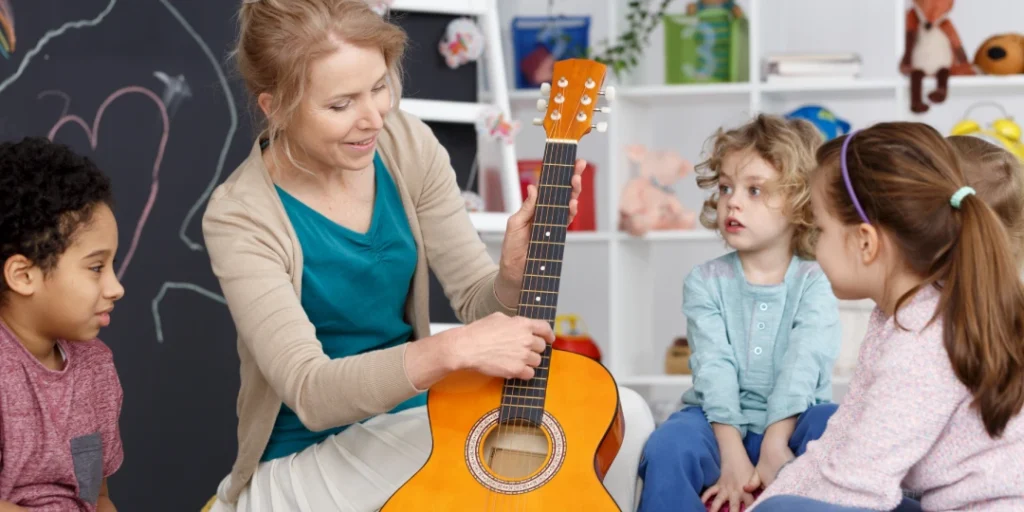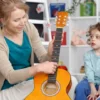![Play, Learn, Thrive: How Murfreesboro Day School Prepares Young Learners for Lifelong Success Introduction: Foundations for a Flourishing Future Murfreesboro Day School understands that the earliest years of a child’s life are the most formative. These foundational years shape not only academic capability […]](https://dayschools.org/murfreesboro/wp-content/uploads/sites/3/2025/05/Murfreesboro-Day-School-8.webp)
Table of Contents
Introduction: Foundations for a Flourishing Future
Murfreesboro Day School understands that the earliest years of a child’s life are the most formative. These foundational years shape not only academic capability but also identity, values, and emotional well-being. Rather than rushing children into rigid systems of performance and testing, the school takes a developmental approach—nurturing each child’s innate curiosity and honoring their unique pace of growth. This philosophy is evident in every classroom, where learning is as joyful as it is intentional.
At Murfreesboro Day School, early education is a carefully orchestrated balance of structured learning experiences and open-ended exploration. The curriculum is built to inspire, not impose. Students engage with materials that encourage experimentation, dialogue, and reflection. Whether they’re exploring number patterns through manipulatives or investigating nature in the outdoor classroom, every activity is a purposeful step toward deeper understanding. The goal is not to prepare students for the next grade level alone, but to instill a mindset of inquiry and adaptability that will serve them for life.
More than an academic institution, Murfreesboro Day School acts as a springboard for lifelong success. Children graduate not only with literacy and numeracy readiness but with confidence, emotional intelligence, and a sense of belonging. Parents and educators alike recognize the school’s impact in creating well-rounded, socially competent, and intellectually curious individuals. The school’s nurturing environment and forward-thinking pedagogy ensure that each child is positioned to thrive—not just in the classroom, but in the world beyond.
The Philosophy Behind Play-Based Learning
Murfreesboro Day School champions a play-based learning philosophy that transforms traditional views of early education. The school recognizes that play is a dynamic and sophisticated form of learning—not a break from it. Through strategic integration of playful experiences, children are empowered to take ownership of their education, explore new concepts organically, and develop a deep-seated love for learning. This method is not random or unstructured; it is carefully rooted in developmental science and guided by skilled educators who know how to extend learning within moments of joyful engagement.
At Murfreesboro Day School, play is not simply recess—it is the primary modality through which complex ideas are introduced and explored. A child building a block tower learns about gravity, balance, and spatial reasoning. Another child narrating a puppet show practices narrative structure, expressive language, and empathy. The school’s environment is thoughtfully designed to support these learning moments with rich materials, varied textures, and interactive spaces. Educators are attuned to children’s interests and use them as springboards for emergent curricula that resonate with young minds.
This play-based approach also enables Murfreesboro Day School to cultivate critical cognitive skills at an early age. As children manipulate objects, negotiate rules with peers, or reenact real-world scenarios, they develop working memory, problem-solving abilities, and self-regulation. These are the very skills that underpin long-term academic achievement and emotional stability. Far from being a soft alternative to academic rigor, play at Murfreesboro Day School is the very mechanism through which rigor is introduced—authentically, meaningfully, and effectively.

Cognitive Development Through Purposeful Play
At Murfreesboro Day School, cognitive development is not confined to worksheets and flashcards—it’s embedded in the fabric of everyday experiences. Purposeful play is a central driver of intellectual growth, allowing children to make sense of the world through trial, error, and discovery. When a child engages in sorting games, patterns begin to emerge. When they build a fort from wooden blocks, they grasp spatial logic, weight distribution, and basic engineering. These moments of “play” are in fact robust exercises in executive functioning.
The educators at Murfreesboro Day School are trained to identify the cognitive potential in every interaction. They know when to step back to allow independent thought and when to intervene with a timely question or challenge. For instance, a child engaged in dramatic play may be asked to create a list for a pretend store—incorporating emergent literacy and early numeracy into an already rich, imaginative context. The goal is to keep cognition active and evolving, without diminishing the child’s sense of ownership or wonder.
Moreover, Murfreesboro Day School integrates cross-disciplinary thinking into its play-based pedagogy. A single project might engage science, math, language, and social reasoning. A nature walk becomes an investigation into ecosystems, a vocabulary expansion exercise, and a counting game all at once. In this way, cognitive development is not fragmented or siloed but deeply interconnected. Children are not taught to memorize facts—they are taught to think, connect, and synthesize.
Emotional Intelligence: Nurturing Empathy and Resilience
Murfreesboro Day School places equal weight on emotional intelligence as it does on academic readiness. The school recognizes that success in life is often determined more by interpersonal acumen and self-regulation than by test scores. Emotional learning is therefore woven into every interaction, whether it’s resolving a playground disagreement or reflecting on one’s feelings during circle time. These experiences build a foundation of empathy, patience, and resilience that will serve children for years to come.
The school’s educators are adept at helping children identify, articulate, and manage emotions in constructive ways. A frustrated toddler is not disciplined into silence but guided to name their feeling and choose an appropriate response. A preschooler grappling with disappointment is encouraged to express their emotions while considering others’ perspectives. Through consistent modeling and guided practice, Murfreesboro Day School equips its students with the tools to navigate emotional landscapes with clarity and compassion.
Beyond self-awareness, the program also emphasizes relationship skills—cooperation, listening, turn-taking, and conflict resolution. These social-emotional competencies are nurtured in the classroom through group projects, storytelling, and peer interactions. Children learn not only how to express themselves but how to listen, support, and adapt in community. The result is a confident learner who not only excels individually but contributes meaningfully to group dynamics—an invaluable trait in both academic and life settings.
Structured Learning in an Unstructured Environment
Murfreesboro Day School skillfully balances structure with freedom, recognizing that young learners thrive within predictable routines but need ample room for self-direction. The daily schedule is carefully organized to provide consistency—circle time, learning centers, snack breaks, and outdoor play—yet it remains flexible enough to accommodate spontaneous inquiry. This approach cultivates a sense of security while encouraging children to follow their curiosity wherever it may lead.
Rather than imposing rigid lesson plans, educators at Murfreesboro Day School use a framework that allows for emergent curriculum design. If a group of children expresses interest in insects, for example, the week’s activities might evolve to include a bug hunt, insect-themed stories, and basic entomology lessons. These explorations align with academic standards but originate from the children’s natural interests, increasing engagement and retention. Structure exists—but it breathes.
The physical classroom environment also reflects this philosophy. Open-ended materials, accessible learning zones, and varied textures invite experimentation and self-expression. Children choose how and where to engage—whether constructing a tower, painting a mural, or reading a book in a quiet nook. This sense of autonomy is crucial for developing intrinsic motivation and independent learning habits. Murfreesboro Day School ensures that even its unstructured moments are profoundly educational, equipping students with the confidence and adaptability essential for the future.

A Curriculum Designed for Holistic Growth
Murfreesboro Day School delivers a curriculum that goes beyond checklists and standardized outcomes; it is an intentionally crafted framework designed to nourish the whole child—intellectually, emotionally, socially, and physically. Each facet of the curriculum is anchored in developmental appropriateness and enriched with real-world relevance. Subjects are not siloed but interconnected, enabling children to experience learning as a dynamic, fluid process rather than a series of isolated tasks.
In practice, this holistic curriculum unfolds through thematic units, hands-on projects, and interdisciplinary exploration. A lesson on community helpers might integrate storytelling, dramatic play, math (counting tools), and art (drawing uniforms or buildings). Children learn about the world while simultaneously building fine motor skills, expanding their vocabulary, and engaging in cooperative learning. Murfreesboro Day School ensures that learning is never passive—children do not simply absorb content; they live it.
Physical development is also a central component of the school’s curriculum. Regular movement is integrated into the daily routine, whether through structured physical education, outdoor play, or sensory activities. Fine motor refinement is supported through writing, crafting, and manipulatives, while gross motor skills are honed during climbing, balancing, and running activities. By prioritizing holistic development, Murfreesboro Day School fosters balanced, capable learners equipped with the cognitive clarity, physical stamina, and emotional insight needed for future challenges.
The Role of Educators as Guides and Mentors
The educators at Murfreesboro Day School are more than instructors—they are intentional guides and deeply invested mentors. Each teacher operates from a philosophy that views children not as empty vessels to be filled, but as individuals rich with potential. With this mindset, teachers step into the role of co-explorers and thought partners, skillfully guiding learning through thoughtful observation, timely intervention, and gentle encouragement.
These educators are trained to recognize teachable moments in the ordinary. A spilled paint jar becomes a chance to talk about cause and effect; a disagreement over toys opens a dialogue on fairness and compromise. The staff is attuned to each child’s temperament and learning style, allowing them to differentiate support with nuance and empathy. At Murfreesboro Day School, educators do not rush learning—they pace it, personalize it, and elevate it.
Professional development is an ongoing priority. Teachers at Murfreesboro Day School engage in continual training to stay attuned to best practices in early childhood education, emergent curriculum, and social-emotional development. This commitment to excellence translates into an enriched learning environment where children are consistently challenged, supported, and inspired. Through mentorship that respects individuality and cultivates confidence, these educators lay the groundwork for resilient, motivated learners.
Safe, Stimulating Spaces That Encourage Exploration
The learning environment at Murfreesboro Day School is as deliberate as the curriculum itself—every space is curated to inspire inquiry, promote independence, and ensure safety. Classrooms are thoughtfully arranged into distinct zones that encourage purposeful movement and hands-on engagement. Materials are displayed at child height, inviting autonomy and choice. The result is an atmosphere that feels both secure and liberating—a place where children are free to experiment, take risks, and discover.
Natural light, soft textures, and warm, inviting colors transform each room into a haven for learning. The aesthetic is not sterile or overstimulating, but balanced and nurturing—designed to reduce stress and enhance focus. Quiet corners offer solitude for reflection or reading, while collaborative areas encourage peer interaction and group problem-solving. This spatial diversity honors different temperaments and supports a wide range of learning modalities.
Beyond the indoor classroom, Murfreesboro Day School extends its pedagogy into nature. Outdoor classrooms, gardens, and open play spaces become laboratories of exploration. Here, children observe insects, measure rainfall, and engage in imaginative play with found objects. The physical environment, in all its forms, acts as a “third teacher”—reinforcing concepts, sparking new questions, and nurturing a deep-rooted connection to the world around them.
Parent Partnership: Bridging Home and School
At Murfreesboro Day School, education is seen as a collaborative endeavor—one that extends beyond the classroom and deeply involves the family. The school fosters an open, respectful, and ongoing dialogue between educators and parents, recognizing that consistency between home and school environments plays a critical role in a child’s development. Parents are not simply observers but are welcomed as partners, advocates, and co-nurturers of their child’s growth journey.
Communication is frequent, transparent, and intentional. Weekly newsletters, digital portfolios, parent-teacher conferences, and informal daily updates ensure families remain informed and engaged. Whether it’s sharing a photo of a child’s latest science experiment or detailing a new behavioral milestone, Murfreesboro Day School strives to make parents feel connected and empowered. This proactive communication builds trust and allows parents to extend the learning experience into the home with relevance and purpose.
The school also invites parents into the learning process through events, volunteer opportunities, and curriculum nights. These occasions are more than ceremonial—they are chances to observe, participate, and understand the methodologies that drive student success. As parents witness the intentionality behind the school’s play-based approach, they develop a deeper appreciation for the developmental philosophies in place. This alignment between school and home strengthens the child’s confidence, reinforces expectations, and promotes holistic, sustained development.

Long-Term Benefits: Beyond Kindergarten Readiness
The outcomes of a Murfreesboro Day School education are evident not just in immediate milestones, but in the long arc of a child’s academic and personal trajectory. While traditional metrics of success—letter recognition, counting, and phonemic awareness—are consistently met or exceeded, the true power of the program lies in the less quantifiable yet equally essential capacities: curiosity, resilience, independence, and social fluency. These attributes form the backbone of lifelong success.
Graduates of Murfreesboro Day School enter elementary school with a readiness that transcends academics. They exhibit adaptability in new settings, navigate peer dynamics with empathy, and approach challenges with a problem-solving mindset. Their intrinsic motivation to learn sets them apart—they don’t just comply with expectations; they engage with purpose. Educators at receiving schools frequently note their preparedness, emotional maturity, and ability to lead and collaborate.
As these students continue through their academic journeys, the foundational skills instilled at Murfreesboro Day School continue to yield dividends. They are better equipped to manage transitions, advocate for themselves, and think critically. These early competencies compound over time, leading to greater academic confidence and more enriched personal development. Ultimately, Murfreesboro Day School does not merely prepare children for kindergarten—it prepares them for a lifetime of learning, growth, and meaningful participation in the world.
Conclusion: Cultivating Lifelong Learners from the Start
Murfreesboro Day School stands as a model of what early childhood education should aspire to be—intentional, enriching, and deeply human. It is a place where learning is not reduced to test preparation, but elevated to a formative experience that shapes character, intellect, and imagination. From the thoughtful design of its curriculum to the heartfelt connections fostered between educators, students, and families, every element reflects a commitment to nurturing the whole child.
Children who begin their educational journey at Murfreesboro Day School are not just prepared for the next step—they are inspired to take it with confidence and joy. They leave with far more than kindergarten readiness; they carry forward the ability to think critically, relate empathetically, and engage curiously with the world around them. These foundational attributes are the true markers of success in the modern age—qualities that equip young learners to thrive in any context they encounter.
As families continue to seek schools that honor both academic excellence and developmental integrity, Murfreesboro Day School remains a beacon. It reaffirms that education, when done with purpose and care, has the power to transform lives. By planting the seeds of wonder, resilience, and lifelong learning in its youngest students, the school ensures that its impact endures far beyond the classroom—into futures that are bright, bold, and beautifully self-directed.






